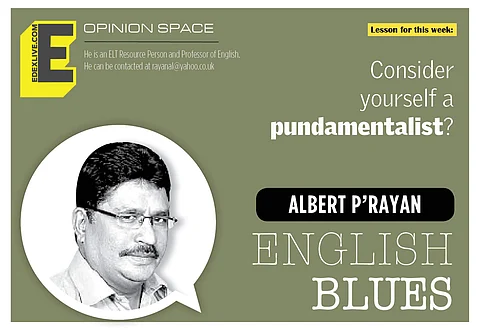

Husband: Our neighbour Ramesh uncle is no more.
Wife: Shocking news! Did he die of corona?
Husband: No.
Wife: Was he sick?
Husband: No.
Wife: Then, what’s the cause?
Husband: The death was due to the rising pulses price.
Wife: Are you kidding?
Husband: It’s true. I had a look at his death certificate.
Wife: Was the cause of death mentioned?
Husband: Yes. ‘Death due to high pulse rate’.
A pun can be defined as the use of a word that either has multiple meanings or sounds like other words, the result of which is humorous. It is a gentle form of humour. Words with double or multiple meanings have primary and secondary meanings. In a pun, the primary and obvious meaning of a word is usually quite reasonable, whereas the secondary or less obvious meaning may be less sensible and amusing in some way. Only those who have command over the language can use puns effectively.
Some hate puns and some love puns. Recently, a friend described her colleague as a ‘pundamentalist’. You can easily guess the meaning of the term. It is a portmanteau word. It is a combination of ‘pun’ and ‘fundamentalist’. Pundamentalists, like fundamentalists, are conservatives who criticise novelty. Pundamentalists consider jokes as a lower form of humour. Most people enjoy puns and they can be called ‘punatics’ or ‘punphiles’.
Many words in English have multiple meanings. In the case of ‘pulse’, the word refers to a person’s heart rate and it also means edible seeds of crops such as peas, beans or lentils. Learners of English should learn the meanings of words in appropriate contexts. By exposing learners to different types of puns that help them understand the nuances of the English language, English language teachers can help learners learn the language better. Let’s look at some humorous puns:
Husband: How’d you get hit with a book?
Wife: I only have my shelf to blame.
Friend 1: Where you do see yourself in five years?
Friend 2: In a mirror.
What did the coffee tell his date?
“Girl, you’re steaming!”
A horse is a very stable animal.
In the first example, it is a pun on the word ‘myself’ and ‘my shelf’. It makes us wonder whether the woman blames her shelf (bookshelf) or herself. In the second example, the question ‘Where do you see yourself in five years’ is normally asked in interviews to check whether the candidate has a clear career goal. The pun on the word ‘see’ makes the friend give the humourous answer of a ‘mirror’. It is very easy to understand the pun in the other examples. Have fun with puns as we are in a ‘punny’ world!
